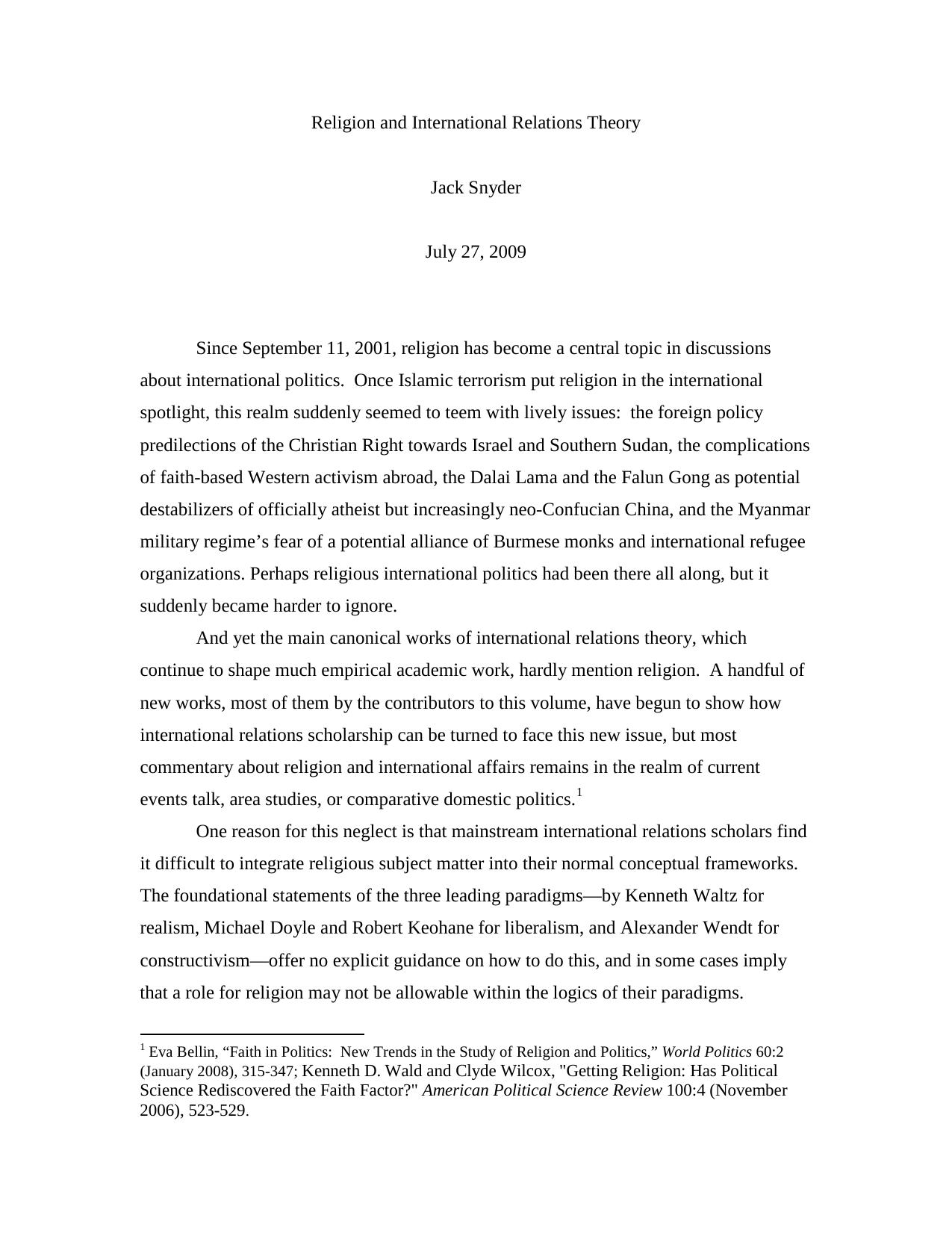Religion and International Relations Theory by Snyder Jack

Author:Snyder, Jack.
Language: eng
Format: epub, pdf
Tags: Political Science/International Relations/General
Publisher: Perseus Books, LLC
Published: 2011-08-26T16:00:00+00:00
He similarly suggests that the the liberal order of equality, rights, and democracy might be sustained by more than a Rawlsian “overlapping consensus” based on Kantian utilitarian grounds and theological grounds. Secularization did not kill religion. Instead, projects that are viewed by many as quintessentially secular are sustained and given meaning by religious beliefs.
Although Taylor largely limits the transcendental to the religious, Craig Calhoun and others argue that the transcendental need not pivot on God, but can exist wherever there are collective beliefs that refer to the divine and that conceive of practical action as designed to transform oneself and the environment in order to bring about a greater good.49 Consider human rights. Arguments about natural rights and human dignity are defended not only in terms of their instrumental value for other kinds of positive outcomes (including peace and prosperity) but also in terms of basic notions of justice and humanity that are part of the “divine.” Humanitarian action is defended not only in terms of its contribution to international peace and security but also because it signifies the kind of world order that many would like to bring into existence. Many of the attributes of a liberal international order (and international ethics more broadly) are embedded in a cosmopolitanism and transcendentalism that is concerned not only with human flourishing but also the possibility of transforming oneself in relation to others and a broader moral universe. In short, modern day liberalism, this secularized liberalism, has a religious content because of its relationship to the transcendental.50 If so, the modern liberal international order is not evidence of the triumph of secularism, as most international relations theorists assert, but rather the ascendance of a particular brand of secularism that itself has a strong religious content and is tied to the transcendental.
I must emphasize that the transcendental is not the universal—the transcendental is always historically and culturally situated. International ethics can have elements of the religious to the extent that those elements are constituted by the transcendental, but this is a transcendental born of a particular time and place, even if it is defined by its advocates as timeless. Consider, once again, humanitarianism. The idea of humanitarianism—the attempt to ameliorate the suffering of distant strangers—might appear to have an unambiguously universal character. Both Christian and Islamic aid agencies are inspired by religious commitments to help the poor and the suffering. Yet these different faith traditions also understand the purpose and principles of humanitarianism in fundamentally different ways, and tie them to very different understandings of a transcendental world order. For many Christian aid agencies it has been practically impossible to spread Christianity without also directly or indirectly transforming various aspects of social relationships and creating new kinds of transnational relations. The same is true for many Islamic aid agencies. In other words, the desire to relieve suffering, presumably a universal good and the purest expression of a transcendental ethic, is itself reflective of a particular understanding of order.
In sum, our contemporary world order might have a religious dimension in visible and veiled ways.
Download
Religion and International Relations Theory by Snyder Jack.pdf
This site does not store any files on its server. We only index and link to content provided by other sites. Please contact the content providers to delete copyright contents if any and email us, we'll remove relevant links or contents immediately.
The Secret History by Donna Tartt(19093)
The Social Justice Warrior Handbook by Lisa De Pasquale(12191)
Thirteen Reasons Why by Jay Asher(8912)
This Is How You Lose Her by Junot Diaz(6889)
Weapons of Math Destruction by Cathy O'Neil(6281)
Zero to One by Peter Thiel(5802)
Beartown by Fredrik Backman(5759)
The Myth of the Strong Leader by Archie Brown(5510)
The Fire Next Time by James Baldwin(5449)
How Democracies Die by Steven Levitsky & Daniel Ziblatt(5219)
Promise Me, Dad by Joe Biden(5154)
Stone's Rules by Roger Stone(5088)
A Higher Loyalty: Truth, Lies, and Leadership by James Comey(4965)
100 Deadly Skills by Clint Emerson(4927)
Rise and Kill First by Ronen Bergman(4790)
Secrecy World by Jake Bernstein(4754)
The David Icke Guide to the Global Conspiracy (and how to end it) by David Icke(4720)
The Farm by Tom Rob Smith(4514)
The Doomsday Machine by Daniel Ellsberg(4490)
